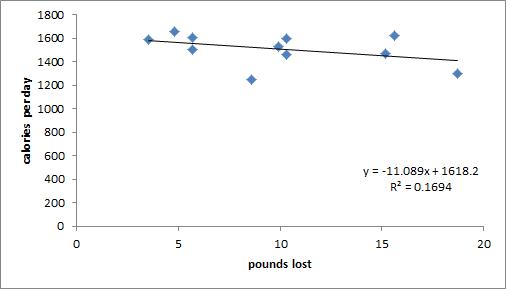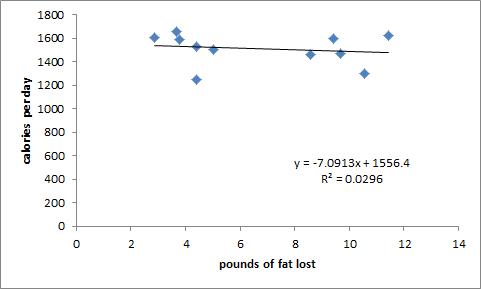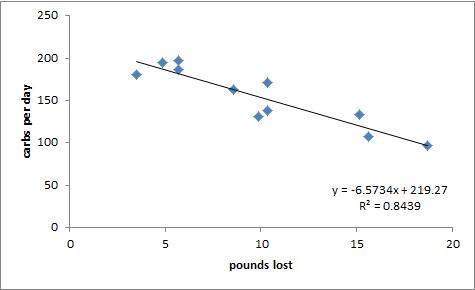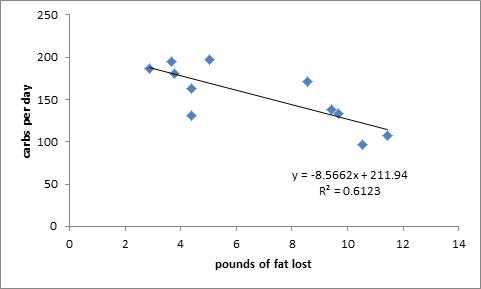The Optimal Diet, Atkins
, South Beach
, Paleo
, Zone
… all have one thing in common: some degree of carbohydrate restriction.
Low, lower, lowest: does it matter?
There are 4 relatively large, randomized ‘diet-induced weight loss’ studies that all reported fairly comprehensive food intake and body composition data. The studies ranged in duration from 24 weeks to one year and included anywhere between 50 and ~300 overweight and obese participants.
In general, participants assigned to the low fat intervention were advised to restrict calories and fat whereas those assigned to low carb were told they could eat as much as they wanted as long as it wasn’t carbs.
Your mileage may vary – but these studies cover a large number of subjects from a wide range of backgrounds, suggesting the results might be applicable across the board. Conclusion? the amount of body fat lost was much more strongly associated with the reduction in carbohydrates than calories. The only modestly surprising aspect was the magnitude… (see the figures below).
The four studies, in chronological order:
Brehm 2003: over the course of 6 months, those who consumed an average of 163 grams of carbohydrate per day lost 8.6 pounds of body weight while those who consumed 97 grams lost 18.7 pounds.
McAuley 2005: 24 weeks; those who ate 171 grams lost 10.3 pounds, while those who ate 133 grams lost 15.2 pounds, and those who ate 107 grams lost 15.6 pounds.
Maki 2007: 36 weeks; those who ate 186 grams lost 5.7 pounds, those who ate 131 grams lost 9.9 pounds.
Gardner 2007: 1 year – those who ate 138 grams lost 10.3 pounds, 181 grams lost 3.5 pounds, 195 grams lost 4.8 pounds, and 197 grams lost 5.7 pounds.
Note in chart above; obese participants assigned to low[ish] carbohydrate diets (red) spontaneously reduce calorie intake, almost to the same degree as those assigned to calorie-restricted, low fat diets.
Plotting all of the data together yields a rather poor relationship between calorie intake and weight loss:
And the picture doesn’t change much if body weight is replaced by fat mass:
However, if calories are replaced by carbohydrates, the association is much stronger:
Same holds true for fat mass:
Part II
“those assigned to low carb were told they could eat as much as they wanted as long as it wasn’t carbs.”
1. Carbohydrate restriction is almost always accompanied by a spontaneous reduction in appetite; “ad lib” low carb works very well for obese patients. Once a reduced body weight is achieved, “ad lib” may not work so well as evidenced by near universal weight regain (regardless of diet).
In some of the studies, those assigned to low carb ended up eating slightly more than those on low fat (see graph above). Interestingly, however, those assigned to low carb still lost more weight and body fat.
2. It’s not magical; the [notorious] Ebbeling study showed low carb = better preservation of energy expenditure in weight-reduced people.
The Laws of Energy Balance. They work.
If you like what I do and want to support it, check out my Patreon campaign!
UPDATED Affiliate links: still looking for a pair of hot blue blockers? Carbonshade is offering 15% off with the coupon code LAGAKOS and Spectra479 is offering 15% off HERE.
If you have no idea what I’m talking about, read this then this.
20% off some delish stocks and broths from Kettle and Fire HERE.
If you want the benefits of ‘shrooms but don’t like eating them, Real Mushrooms makes great extracts. 10% off with coupon code LAGAKOS. I recommend Lion’s Mane for the brain and Reishi for everything else.
Join Earn.com with this link. Get free magical internet money!





